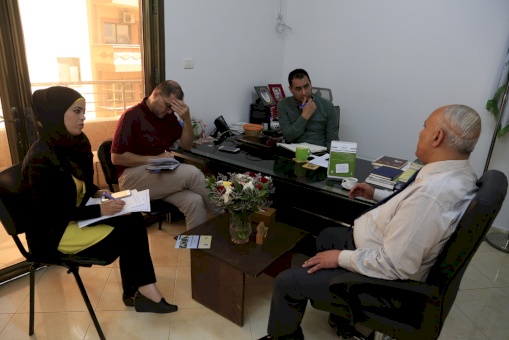
Gaza - The Coalition for Integrity and Accountability-AMAN has launched a national campaign in mid-June 2018 entitled Clean Hands, "Beneficiaries Access to Humanitarian Assistance is our Responsibility all". The campaign aims to pressure all official parties in the occupied Gaza Strip to enhance access of beneficiaries to humanitarian assistance and to ensure its distribution in a fair and equitable manner based on a clear mechanism and declared standards.
The campaign was a response to the legal advice requests AMAN received from citizens who complaint due to inability of access to assistance – although they meet the conditions of eligibility for such assistance - in addition to the unclear assistance distribution mechanism as well as their suspicion of legal violations and corruption practices that are mostly favoritism “Wasta” and nepotism-based, which prevents the beneficiaries from access to assistance.
Therefore, the Coalition conducted a live open session broadcasted by Sawt Al-Quds “Voice of Jerusalem” Radio last month – to which there were wide reactions – and the issue was raised to all parties that are entrusted with providing and controlling humanitarian assistance. The radio dialogue has also included live testimonies on corruption suspicions in assistance provision and that some persons - including those who received assistance – have traded and resold the assistance for financial return.
In the context of launching the “Clean Hands” Campaign activities to enhance the beneficiaries’ access to assistance, the Coalition held a special meeting with officials from the Ministry of Social Development and Ministry of Interior to identify the problems of assistance distribution. The meeting was attended by the Deputy Minister of Social Development, Dr. Yousef Ibrahim and the Director General of Public Affairs and NGOs at the Ministry of Interior, Mr. Ayman Ayesh.
The Coalition's position and recommendation was to examine the opportunities and challenges of adopting a consolidated portal for humanitarian assistance by both official and unofficial parties – which represents a key pillar of institutionalizing a fair distribution of assistance and to pass through a single channel in order to facilitate its control and to bridge the gaps that undermines its completion efforts. This can be done through addressing the challenges facing the responsible parties in terms of publishing the criteria for assistance distribution and adopting a consolidated published complaint system that ensures control on assistance distribution and ensures the responsiveness of official authorities to citizens in order to adopt integrity values, transparency principles and accountability systems included in the Manual of Preventing Corruption in Humanitarian Assistance.
In the midst of the meeting, AMAN expressed its concerns of duplicated distribution cases because the NGOs and most of international organizations, including the United Nations organizations, do not unclose information on exchanging the data of their beneficiaries; in addition to information on the mechanism of assistance distribution by these organizations, which may lead to losing the principle of equal opportunities that achieves equitable distribution among citizens.
The Coalition has called the relevant institutions to consolidate their database to bridge the gap in assistance distribution issue, continuously share such data and talk about the possibility of digitizing and archiving the cases of beneficiaries.
AMAN will proceed to achieve the Campaign goals towards creating a state of collective pressure and conducting further awareness activities that push towards adopting a single and consolidated portal mechanism for humanitarian assistance, educating the citizens on the criteria and mechanisms of assistance distribution, exerting pressure on local and international organizations to disclose their distribution mechanisms calling the latter to understand their actual role in diagnosing the humanitarian assistance environment in Gaza to ensure that such assistance go to its due beneficiaries.
